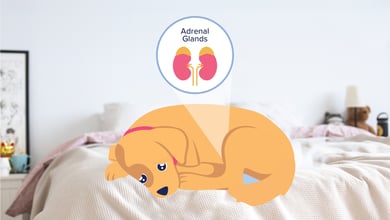Heartworm Disease in Pets: Everything to Know

Table of Contents
In this guide, we will delve into the transmission of heartworm disease, explore its impact on pets, and discuss proactive strategies to keep our furry friends safe and healthy. By staying informed and proactive, we can provide our pets with the best defense against this dangerous disease.
Key Takeaways:
- Heartworm disease is a serious and potentially life-threatening condition that affects pets, primarily dogs, cats, and ferrets.
- Heartworm disease is primarily spread through the bite of infected mosquitoes.
- Monthly heartworm preventatives are recommended to protect pets from heartworm infection throughout the year.
What Is Heartworm Disease?
Heartworm disease is a serious and potentially life-threatening condition that affects pets, primarily dogs, cats, & ferrets. It is caused by a parasitic worm known as Dirofilaria immitis. The disease gets its name from the fact that the worms primarily reside in the heart and pulmonary arteries of infected animals.
How Is Heartworm Disease Spread?
Heartworm disease is primarily spread through the bite of infected mosquitoes. Because dozens of mosquito species can host and transmit these worms, it can be found globally. Here’s a list of contributions to the spread of heartworm globally:
- Changes in weather trends
- Missed heartworm preventative doses
- Relocation of pets
It used to be the case that it was found mainly in the south and southeast regions of the USA. While these warmer regions of the country still have a higher incidence of infection, no state is free of heartworm disease at this time, and, often, a relatively heartworm-free region can have ‘hotspots’ of infection. Keeping your pet safe from this disease is crucial no matter where you live.
Once a mosquito transmits the parasite to your pet, it may take years to cause obvious clinical disease, but during this time, your pet’s health is being compromised.
Test Your Knowledge of Heartworm
1. Dogs can get heartworms from other animals
2. Once dogs are treated for heartworm, they become immune to future infections
3. Heartworm disease is only a problem in some states
4. Heartworms can only live inside a pet for 6 months
5. Heartworm disease can be deadly
6. My cat cannot get heartworm disease
7. My pet only needs heartworm preventative in the spring and summer months
8. I don’t need a prescription for my dog’s heartworm prevention
9. My pet does not need an annual heartworm test if they receive heartworm prevention
10. Heartworm treatment costs about the same as prevention
View Results
Your Score is
1. Dogs can get heartworms from other animals | FALSE
Heartworms can only be transmitted to your pet by infected mosquitoes. Mosquitoes carry heartworm larvae that they have picked up from infected animals. The larvae develop in the mosquito, which can then be passed on to dogs and cats when bitten by the infected mosquito.
When a pet is bitten, the heartworm larvae are transferred onto their cat or dog’s skin, entering the bloodstream and migrating to the heart and lungs. It takes approximately six months for larval worms to migrate, mature, and reproduce.2. Once dogs are treated for heartworm, they become immune to future infections | FALSE
3. Heartworm disease is only a problem in some states | FALSE
4. Heartworms can only live inside a pet for 6 months | FALSE
5. Heartworm disease can be deadly | TRUE
6. My cat cannot get heartworm disease | FALSE
7. My pet only needs heartworm preventative in the spring and summer months | FALSE
8. I don’t need a prescription for my dog’s heartworm prevention | FALSE
9. My pet does not need an annual heartworm test if they receive heartworm prevention | FALSE
10. Heartworm treatment costs about the same as prevention | FALSE
Share Quiz
What Do Heartworms Look Like?
Heartworms are long and stringy, often compared to spaghetti. Female heartworms can grow up to 10 to 12 inches, while males reach about 4 to 6 inches.
It's important to note that heartworms cannot be visually detected in pets. They reside inside the heart and pulmonary arteries and cannot be seen in your pet's stool.
Heartworm Disease in Dogs
The severity of heartworm disease in dogs depends on how many worms are present, the activity level and health of the dog, and how long the dog has been infected. Early in the disease, your pup may exhibit no signs at all or may have just an occasional mild cough. In more severe cases of heartworm, fatigue, a persistent cough, trouble breathing, and even fainting episodes can be common in dogs.
You may have heard plenty about this disease and have diligently kept all your dogs on heartworm prevention their whole lives. But did you know that cats and ferrets are also susceptible to it? While the dog is the definitive host for heartworms, many other species can be affected; the progression of heartworm is very different in each of these species but can be quite severe in all.
It's essential to take preventive measures to protect your furry friend from heartworm disease. Discover effective strategies for heartworm prevention in dogs to ensure their long-term well-being.
Heartworm Disease in Cats
Cats and ferrets respond to heartworm disease slightly differently than do most dogs. Because they’re generally smaller, it doesn’t take very many worms to make cats and ferrets quite sick. In cats, signs can range from very subtle to quite severe, including sudden collapse and death.
The signs of heartworm in ferrets resemble those in dogs, but often show up much sooner because of the ferret’s smaller size. Paying attention to your furry family members’ energy, appetite, and breathing is a good idea; making sure they stay on year-round heartworm prevention is an even better one!
To protect your feline companion from this disease it's crucial to prioritize preventive measures. Explore practical strategies for heartworm prevention in cats, ensuring their long-term health and happiness.
Preventing Heartworm Disease in Pets
Treatment for heartworm disease can be hard on your dog or cat; the process can be long, expensive, and not without risk of complications for your pup. Additionally, there is no approved therapy for heartworm infection in cats and ferrets; treatment for these pets primarily focuses on stabilizing them through their illness.
Luckily, it is easily preventable in all three species! As early as 6-8 weeks of age, your pet can be started on a monthly prescription heartworm preventative like Heartgard or Revolution. Since mosquitoes can easily enter our homes, even primarily indoor pets should stay on year-round heartworm prevention. Your veterinarian can help you select a product that’s right for your cat or dog and talk to you about routine screening.
Regular diagnostic testing and monthly doses of preventative medication are the best way to keep your pet safe from this costly and dangerous disease.
Heartworm Disease Symptoms in Pets
Detecting heartworm disease in its early stages can be challenging since many pets may not show obvious signs. However, as the infection progresses, symptoms may become more noticeable. Here are some common symptoms of heartworms to look out for:
- Mild cough that worsens over time
- Fatigue and decreased energy levels
- Decreased appetite and weight loss
In cats, heartworm disease presents differently. Cats may experience fainting, seizures, or difficulty walking. Unlike dogs, coughing is not a typical symptom in cats. The severity of the infection can vary, leading to different manifestations of the disease.
If you suspect your pet might have heartworm, it's crucial to seek prompt help from a BetterVet veterinary doctor. This disease worsens over time, underscoring the importance of early detection. You can schedule a sick pet visit or a convenient virtual vet video consultation to address your concerns.
Remember, heartworm disease is not directly contagious between animals. If one of your pets has heartworms, it cannot transmit the infection to others without the help of a mosquito bite. However, it's important to note that mosquitoes can infect multiple pets within a shared area or household.
Testing for Heartworm
Diagnosing heartworm disease is done through a quick and easy blood test that only needs a few drops of blood. During a home visit, our BetterVet doctors collect the sample and may also examine it under a microscope.
Even if your pet shows no signs of heart disease, it's recommended by the American Heartworm Society to have them tested every 12 months. This is because heartworm preventives can be harmful if your pet already has the disease. That's why prescriptions are required for preventives to ensure your pet's safety.
The testing process is straightforward and speedy, with results usually available within 24 hours. The blood test detects specific heartworm proteins called antigens. If your pet has heartworm disease, these antigens will be in their bloodstream.
Conclusion
Heartworm disease is a serious danger to our pets' health and well-being. It spreads through mosquito bites and can cause severe problems in dogs, cats, and ferrets. Regular testing for heartworm, even in pets without symptoms, helps detect it early and take quick action.
Monthly heartworm preventatives, available in different forms, are an effective defense against heartworm infection. By making prevention a priority all year round, no matter how your pet lives, you can ensure their long-term health and happiness.
At BetterVet, our experienced veterinarians provide comprehensive care for your beloved pets. We offer convenient home visits that include heartworm testing and personalized recommendations for preventive medications. We are dedicated to keeping your pets safe. Don't risk your pet's health—schedule a veterinary check-up with BetterVet today and give them the best protection against heartworm disease.
Frequently Asked Questions
When should I start heartworm prevention for my pet?
Heartworm prevention should ideally start when your pet is young, around 6 to 8 weeks old. It's essential to consult with your veterinarian to determine the best time to begin preventive measures. Starting early helps protect your pet from the risk of heartworm disease and ensures their overall well-being.
Where do heartworms come from?
Infected mosquitoes transmit heartworms. While an infected mosquito can bite humans, we are not the natural hosts for heartworms, and the larvae perish after injection. Heartworms primarily affect dogs, cats, ferrets, and other wild animals. Just one bite from an infected mosquito is all it takes for an animal to become infected with heartworms.
What are the stages of heartworm infection in pets?
First, an infected mosquito must bite your pet, introducing heartworm larvae into their body. The larvae then travel through the tissues and gradually invade the bloodstream. Eventually, mature heartworms settle in your pet's large blood vessels and heart, where they grow and multiply. If left untreated, heartworm disease worsens and can lead to severe illness and even death.





